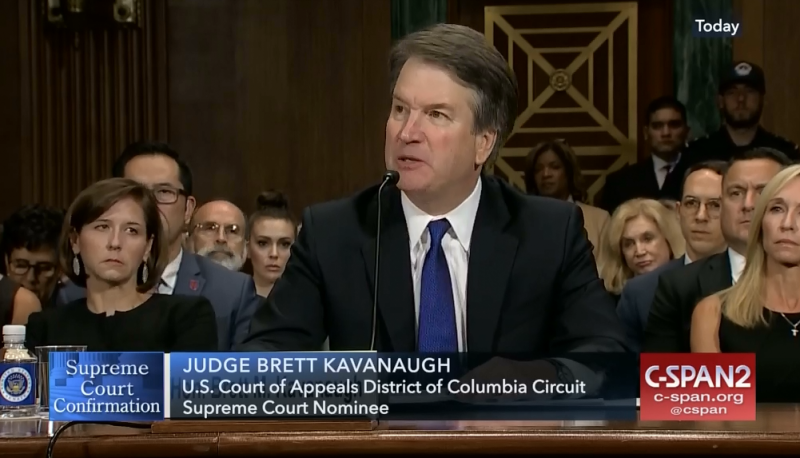On December 18, as widely expected, the judicial body tasked with investigating misconduct complaints against federal judges dismissed all of the complaints filed against then-Judge Brett Kavanaugh for his misconduct before and during his Supreme Court confirmation hearings. (PFAW had filed an ethics complaint with the D.C. Bar, which also dismissed it.)
At the request of the D.C. Circuit Judicial Council, which sought to avoid any appearance of conflicts of interest, the complaints were quickly transferred to the Tenth Circuit Judicial Council. As head of the multi-judge council, Chief Circuit Judge Timothy Tymkovich wrote the unanimous dismissal order, but in a way that allowed the judges to register their recognition of the gravity of the allegations.
The Judicial Conduct and Disability Act sets forth a code of ethics for federal judges to follow, and for circuit judicial councils to enforce. But the Act very clearly covers only lower court judges. Once Kavanaugh became a justice, the Judicial Council lost its authority to discipline him.
The Judicial Council could have dismissed the complaints with a brief one-or-two-sentence order that does not say what the allegations were. Indeed, that often occurs when lower court judges evade accountability by retiring. But in this case, the Council published an order that summarized the allegations, called them “serious,” and cited the specific codes of conduct that Kavanaugh allegedly violated:
The complaints generally allege that Justice Kavanaugh in his appearances before the Senate Judiciary Committee (1) falsely testified about his involvement in various events or programs while he was Assistant White House Counsel and Secretary to the President during the George W. Bush administration; (2) falsely testified about his personal conduct, behavior, and recollection of events prior to his joining the federal judiciary; and (3) displayed partisan bias and a lack of appropriate judicial temperament. Some complaints allege he engaged in misconduct while he was a judge on the D.C. Court of Appeals by favoring certain parties or interests. In sum, the complaints together allege that Justice Kavanaugh violated the Code of Conduct for United States Judges, Canon 1 (Jud. Conf. of the U.S. 2014) (providing “[a] judge should maintain and enforce high standards of conduct and should personally observe those standards”), Canon 2 and commentary (providing that “[a] judge should avoid impropriety and the appearance of impropriety in all activities” and defining the appearance of impropriety as “when reasonable minds … would conclude that the judge’s honesty, integrity, impartiality, temperament, or fitness to serve as a judge is impaired”), Canon 4 (providing “a judge should not participate in extra judicial activities that … reflect adversely on the judge’s impartiality”), and Canon 5 (providing “[a] judge should refrain from political activity”), among others.
Even more remarkably, the Judicial Council chose to post the complaints against Kavanaugh online for the public to see.
But Kavanaugh’s fellow federal judges didn’t stop there. Since dismissal prevents them from making any finding on the merits of the complaints or taking any action in response to them, the Judicial Council made sure that Congress was made aware of the complaints:
The importance of ensuring that governing bodies with clear jurisdiction are aware of the complaints should also be acknowledged. … Accordingly, we request that the Committee on Judicial Conduct and Disability of the Judicial Conference of the United States forward a copy of this Order to any relevant Congressional committees for their information.
Obviously, members of Congress already know about the complaints. The judges on the Judicial Council know that. Nevertheless, they are conspicuously forwarding all of the information to the one body tasked by the United States Constitution with holding a Supreme Court justice accountable.
The dismissal of the complaints is not the end of the story. With the House in Democratic hands next year, it may choose to conduct genuine inquiries into matters raised during Kavanaugh’s confirmation process. But whatever Congress does, one thing is sure: The American people will forget none of this. Everything about Brett Kavanaugh’s confirmation process was corrupt. He is no more qualified for the Supreme Court now than he was when he was confirmed last summer.

